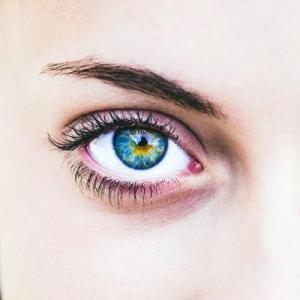 We’ve all had that one friend who can’t step outside without layering on the sunscreen, wearing a wide-brimmed hat and covering up extensively to avoid the dreaded sunburn. Usually, these friends are the ones with fairer skin, who are more prone to skin damage simply due to their DNA. But what about our eyes?
We’ve all had that one friend who can’t step outside without layering on the sunscreen, wearing a wide-brimmed hat and covering up extensively to avoid the dreaded sunburn. Usually, these friends are the ones with fairer skin, who are more prone to skin damage simply due to their DNA. But what about our eyes?
Does having a lighter eye colour mean we are more prone to eye health issues or at higher risk of vision impairment as we age? And are changes in our eye colour as we age normal or a sign of something more serious? The answer isn’t as simple as you might think.
Let’s get science-y
Like the rest of our features, our eye colour is inherited from our parents. Eye colour is a result of the pigment in the iris, which usually appears as either blue, brown or green, depending on our DNA. Interestingly, two brown-eyed people can have blue-eyed children due to recessive genes appearing. A baby can even be born with two different coloured eyes, which is known as congenital heterochromia iridis.
Eye Colour Changes with Age
A common phenomenon with eye colour is the darkening of the iris as we age. In fact, as many as 15% of Caucasian people experience changes in their eye colour as they grow older. In a very small number of cases, this change can be linked to eye disease, however, in most cases, it’s more likely to be a natural occurrence.
Dark or Light Eye Colour?
There’s been much conjecture over the years that people with darker eyes have quicker reaction times and better vision than their light-eyed counterparts. Although, there is no proof to support these claims.
There is proof, however, that those with lighter coloured eyes tend to experience more sensitivity, as the reduced iris pigmentation allows more sunlight into the eyes.
Causes of eye pigmentation change
Besides age and genetics, there are several other causes of iris pigmentation change that are worth knowing about, particularly for those who have already experienced eye disease or trauma or are undergoing eye treatment.
- Iris freckle or naevus. If you have noticed a freckle on your eye, this is a common occurrence and in most cases is harmless. Regardless, it is worth keeping a close eye on these in your regular eye check-ups, as in some cases, though rare, these freckles can develop into an iris melanoma
- Glaucoma eye drops. The darkening of the iris colour is a well-known and common side effect of many eye drops used for the treatment of Glaucoma. If you use Prostaglandin analogue products for example (Latanoprost) then you may notice your eye colour darkening over time
- Trauma. Significant blunt trauma or an intraocular foreign body can cause changes in eye pigmentation. For example, a metal fragment that enters the eye at high speed e.g. hammering metal.
- Diabetes. Because high blood sugar can lead to eye conditions, including cataracts and glaucoma, this disease can also lead to changes in eye colour which are symptomatic of these conditions
- Fuchs Heterochromia Iridocyclitis. Can be associated with a specific form of Glaucoma This condition is generally unilateral, with mild and varying symptoms including blurring and discomfort. Signs include diffuse iris atrophy and small deposits on the inner surface of the cornea.
Eye Surface Changes to Look out for
Another place to look for colour change is the whites of your eye. Any discolouration in this area of the eye should be reported immediately to your eye health professional as it can indicate more serious health issues are afoot.
What to look out for in the whites of your eye:
- They appear red – this may be due to chronic dryness, an infection or UV damage resulting in the development of a pinguecula or pterygium
- They appear yellow-ish – this can indicate jaundice caused by a disease affecting the liver or gallbladder.
- A white ring on the edge of the cornea, common with age, but sometimes associated with raised cholesterol levels. Also known as ‘Arcus senilis’,
The verdict on Eye Colour
You are the best judge on whether changes to your eye appear unnatural or worth investigating. Nobody knows your body better than you do! That’s why it’s important to do a thorough check of your eyes at home to stay on top of any changes that may occur as you age. Remember to always consult your eye health professional immediately if you notice any changes to your eye colour, the surface of your eyes, or your quality of vision.
Generally speaking, eye colour does not determine the quality or longevity of our vision. Although changes to your eye colour should always be monitored to ensure it’s not a sign of something more serious. Regardless of the colour of your eyes, you should always protect your sight by wearing sunglasses outside. No matter the season! Most importantly, get regular check-ups with your eye health professional.
For more information or to make an appointment with KindSIGHT, call 07 3063 1600.

